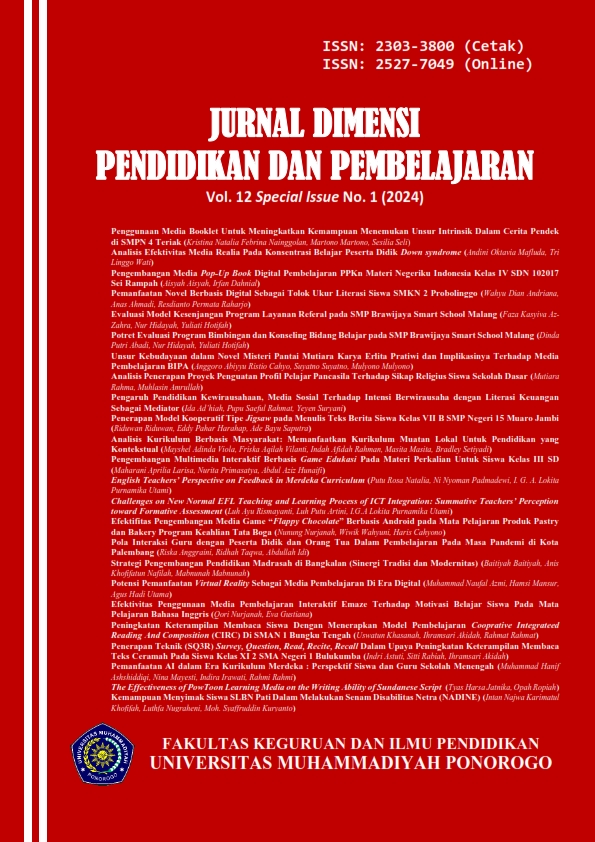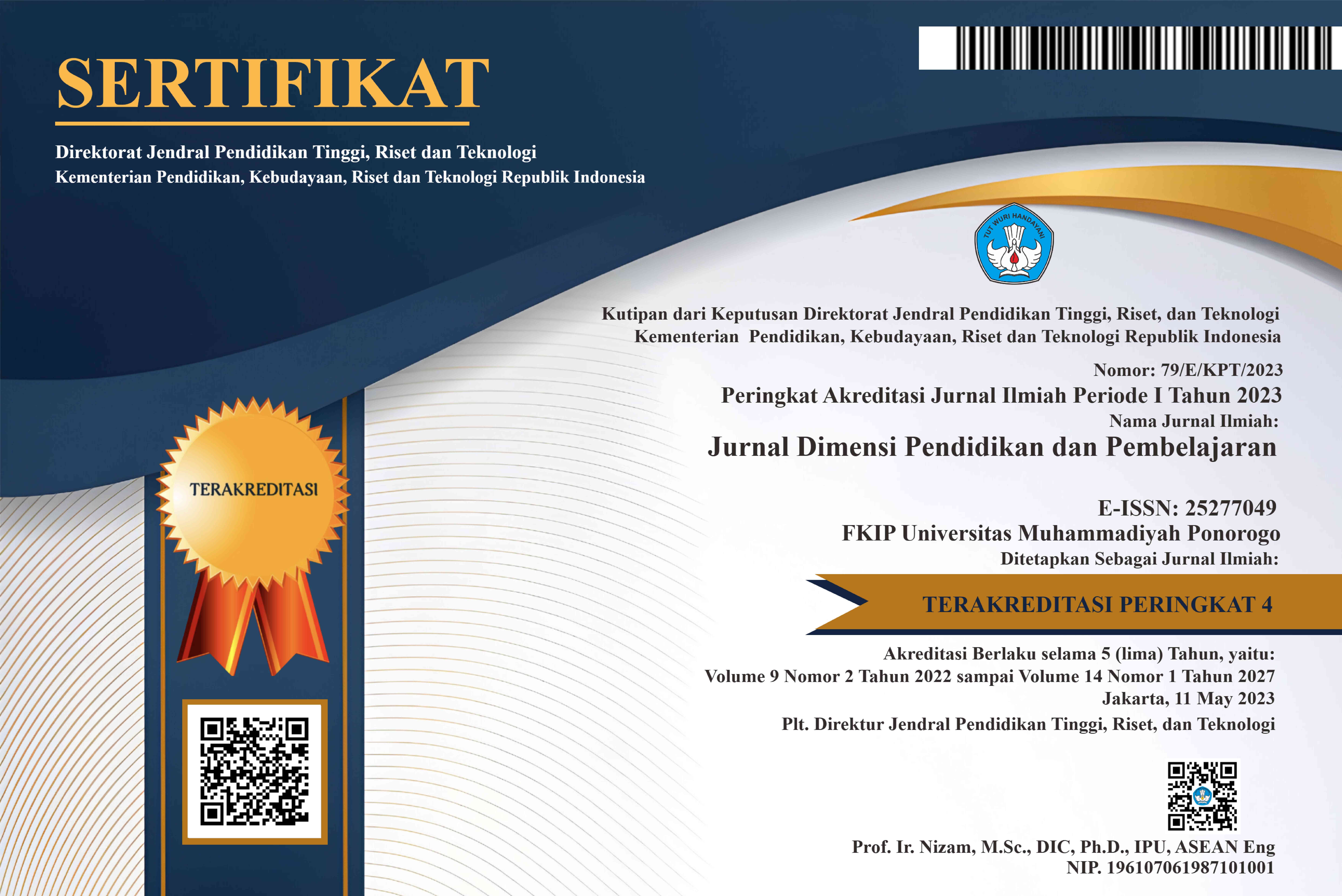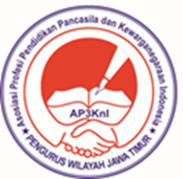English Teachers’ Perspective on Feedback in Merdeka Curriculum
DOI:
https://doi.org/10.24269/dpp.v12i1.9702Abstract This study aims to investigate teachers' perspectives on feedback in English language learning, especially in the Merdeka Curriculum. Three English teachers who teach at Junior High School were interviewed regarding their perspective on feedback, challenges in implementing feedback, and their views on the role of feedback in emphasizing the values of Pancasila Student Profile. A simple qualitative method was used in this study. The procedure includes data collection, data reduction, data display, and drawing conclusions from Miles et al. (2014) were used in this study. The study results show that teachers had a positive perspective on feedback; teachers stated that students' improvement, motivation, and progress are the main reasons they provide feedback. The teacher considered that the choice of words is essential in giving feedback. Meanwhile, time limitations are an obstacle for teachers in providing feedback. Also, teachers agree that feedback emphasizes the value of student independence by emphasizing students to be more independent in their respective learning processes. Also, teachers stated that feedback train students critical thinking as well as giving students the opportunity to make better progress and avoid making the same mistakes in their learning.
References
Abdul Majeed Al-Tayib Umar. (2018). The Impact of Assessment for Learning on Students’ Achievement in English for Specific Purposes A Case Study of Pre-Medical Students at Khartoum University: Sudan. English Language Teaching, 11(2), 15–25.
Aksela, M., Aksela, M., Haatainen, &, & Haatainen, O. (2019). Project-based learning (pbl) in practise : active teachers’ views of its’ advantages and challenges. Education for the RealWorld : 5th International STEM in Education Conference Post-Conference Proceedings, 9–16. http://hdl.handle.net/10138/304045
Alawi, N. H., & Soh, T. M. T. (2019). The effect of project-based learning (pjbl) on critical thinking skills form four students on dynamic ecosystem topic “vector! oh! vector!†Creative Education, 10(12), 3107–3117. https://doi.org/10.4236/ce.2019.1012235
Al-Bashir, Md. M., Kabir, Md. R., & Rahman, I. (2016). The value and effectiveness of feedback in improving students’ learning and professionalizing teaching in higher education. Journal of Education and Practice, 7(16). www.iiste.org
Alqahtani, A. A., & Al-Enzi, E. K. (2011). EFL teachers’ feedback to oral Errors in efl classroom: teachers’ perspectives. Arab World English Journal, 2(1), 214–232. www.awej.org214
Chan, C. K. Y., & Luo, J. (2022). Exploring teacher perceptions of different types of ‘feedback practices’ in higher education: implications for teacher feedback literacy. Assessment & Evaluation in Higher Education, 47(1), 61–76. https://doi.org/10.1080/02602938.2021.1888074
Hamid, H. A., & Romly, R. (2021). Teachers’ perception on giving feedback to students’ online writing assignment during movement control order (mco). Proceedings of the First International Conference on Science, Technology, Engineering AndIndustrial Revolution (ICSTEIR 2020), 461–464.
Harnin, K. N., Padmadewi, N. N., Dewi, N. L. P. E. S., & Suwastini, N. K. A. (2022). Teachers’ perception and practices on giving feedback on students’ work during online learning. Journal of Indonesian Student Assessment and Evaluation), 8(1), 55–67. https://doi.org/10.21009/JISAE
Hattie, J., & Timperley, H. (2007). The Power of Feedback. Review of Educational Research, 77(1), 81–112. https://doi.org/10.3102/003465430298487
Kamran, F., Kanwal, A., Afzal, A., & Rafiq, S. (2023). Impact of Interactive Teaching Methods on Students Learning Outcomes at University level. Journal of Positive School Psychology, 7(7), 89–105. https://www.researchgate.net/publication/372289203
Khairani, I., & Refnaldi. (2020). English teachers’ oral feedback in teaching and learning process. Journal of English Language, 9(1). http://ejournal.unp.ac.id/index.php/jelt
Kurnisar, Waluyati, S. A., Sulkipani, Kusuma, A. D., & Pragista, C. A. (2023). Needs analysis of project based learning (pjbl) teaching materials on engineering materials and evaluation procedures. In Proceedings of the Fifth Sriwijaya University Learning and Education International Conference (SULE-IC 2022) (pp. 42–49). Atlantis Press SARL. https://doi.org/10.2991/978-2-38476-010-7_6
Lee, H. H., Leong, A. P., & Song, G. (2017). Investigating teacher perceptions of feedback. ELT Journal, 71(1), 60–68. https://doi.org/10.1093/elt/ccw047
Lim, S. C., & Renandya, W. A. (2020). Efficacy of written corrective feedback in writing instruction: a meta-analysis. TESL-E (The Electronic Journal for English as a Second Language), 24(3).
McAlpine, M. (2002). Principles of t Assessment. (U. of L. CAA Centre (ed.)). CAA Centre.
Miles, Ma. B., Huberman, A. M., & Saldana, J. (2014). Qualitative data analysis: a methods sourcebook. SAGE.
Muhayyang, M., & Ariyani, A. (2022). The effect of lecturer’s corrective feedback on students writing motivation. Proceeding of The International Conference on Science and Advanced Technology (ICSAT).
Poorebrahim, F. (2017). Indirect written corrective feedback, revision, and learning. Indonesian Journal of Applied Linguistics, 6(2), 184–192. https://doi.org/10.17509/ijal.v6i2.4843
Putri, N. V. W., Munir, A., & Anam, S. (2021). Students’ perceptions of teacher feedback in efl english class and their self-regulated learning after receiving feedback. Journal on English as a Foreign Language, 11(1), 42–60. https://doi.org/10.23971/jefl.v11i1.2237
Rasyid, M. Al, & Khoirunnisa, F. (2021). The effect of project-based learning on collaboration skills of high school students. JURNAL PENDIDIKAN SAINS (JPS), 9(1), 113. https://doi.org/10.26714/jps.9.1.2021.113-119
Rizki, R. A., & Fahkrunisa, L. (2022). Evaluation of Implementation of Independent Curriculum. Journal of Curriculum and Pedagogic Studies (JCPS), 1(4), 32–41. https://e-journal.lp2m.uinjambi.ac.id/ojp/index.php/jcps
Satria, D. (2022). English teachers’ perspective on the practice of project based learning (pbl) approach in the district of bengkalis. Indonesian Journal of Integrated English Language Teaching (IJIELT), 8(2), 2964–6448. https://doi.org/10.24014/ijielt.v8i2.18244
Satria, R., Adiprima, P., Wulan, K. S., & Harjatanay, T. Y. (2022). Panduan Pengembangan Projek Penguatan Profil Pelajar Pancasila. Badan Standar, Kurikulum, dan Asesmen Pendidikan.
Tosuncuoglu, I. (2018). Importance of Assessment in ELT. Journal of Education and Training Studies, 6(9), 163. https://doi.org/10.11114/jets.v6i9.3443
Vanderstoep, S. W., & Johnston, D. D. (2009). Research method for everyday life (1st Edition). Jossey-Bass.
Aksela, M., Aksela, M., Haatainen, &, & Haatainen, O. (2019). Project-based learning (pbl) in practise : active teachers’ views of its’ advantages and challenges. Education for the RealWorld : 5th International STEM in Education Conference Post-Conference Proceedings, 9–16. http://hdl.handle.net/10138/304045
Alawi, N. H., & Soh, T. M. T. (2019). The effect of project-based learning (pjbl) on critical thinking skills form four students on dynamic ecosystem topic “vector! oh! vector!†Creative Education, 10(12), 3107–3117. https://doi.org/10.4236/ce.2019.1012235
Al-Bashir, Md. M., Kabir, Md. R., & Rahman, I. (2016). The value and effectiveness of feedback in improving students’ learning and professionalizing teaching in higher education. Journal of Education and Practice, 7(16). www.iiste.org
Alqahtani, A. A., & Al-Enzi, E. K. (2011). EFL teachers’ feedback to oral Errors in efl classroom: teachers’ perspectives. Arab World English Journal, 2(1), 214–232. www.awej.org214
Chan, C. K. Y., & Luo, J. (2022). Exploring teacher perceptions of different types of ‘feedback practices’ in higher education: implications for teacher feedback literacy. Assessment & Evaluation in Higher Education, 47(1), 61–76. https://doi.org/10.1080/02602938.2021.1888074
Hamid, H. A., & Romly, R. (2021). Teachers’ perception on giving feedback to students’ online writing assignment during movement control order (mco). Proceedings of the First International Conference on Science, Technology, Engineering AndIndustrial Revolution (ICSTEIR 2020), 461–464.
Harnin, K. N., Padmadewi, N. N., Dewi, N. L. P. E. S., & Suwastini, N. K. A. (2022). Teachers’ perception and practices on giving feedback on students’ work during online learning. Journal of Indonesian Student Assessment and Evaluation), 8(1), 55–67. https://doi.org/10.21009/JISAE
Hattie, J., & Timperley, H. (2007). The Power of Feedback. Review of Educational Research, 77(1), 81–112. https://doi.org/10.3102/003465430298487
Kamran, F., Kanwal, A., Afzal, A., & Rafiq, S. (2023). Impact of Interactive Teaching Methods on Students Learning Outcomes at University level. Journal of Positive School Psychology, 7(7), 89–105. https://www.researchgate.net/publication/372289203
Khairani, I., & Refnaldi. (2020). English teachers’ oral feedback in teaching and learning process. Journal of English Language, 9(1). http://ejournal.unp.ac.id/index.php/jelt
Kurnisar, Waluyati, S. A., Sulkipani, Kusuma, A. D., & Pragista, C. A. (2023). Needs analysis of project based learning (pjbl) teaching materials on engineering materials and evaluation procedures. In Proceedings of the Fifth Sriwijaya University Learning and Education International Conference (SULE-IC 2022) (pp. 42–49). Atlantis Press SARL. https://doi.org/10.2991/978-2-38476-010-7_6
Lee, H. H., Leong, A. P., & Song, G. (2017). Investigating teacher perceptions of feedback. ELT Journal, 71(1), 60–68. https://doi.org/10.1093/elt/ccw047
Lim, S. C., & Renandya, W. A. (2020). Efficacy of written corrective feedback in writing instruction: a meta-analysis. TESL-E (The Electronic Journal for English as a Second Language), 24(3).
McAlpine, M. (2002). Principles of t Assessment. (U. of L. CAA Centre (ed.)). CAA Centre.
Miles, Ma. B., Huberman, A. M., & Saldana, J. (2014). Qualitative data analysis: a methods sourcebook. SAGE.
Muhayyang, M., & Ariyani, A. (2022). The effect of lecturer’s corrective feedback on students writing motivation. Proceeding of The International Conference on Science and Advanced Technology (ICSAT).
Poorebrahim, F. (2017). Indirect written corrective feedback, revision, and learning. Indonesian Journal of Applied Linguistics, 6(2), 184–192. https://doi.org/10.17509/ijal.v6i2.4843
Putri, N. V. W., Munir, A., & Anam, S. (2021). Students’ perceptions of teacher feedback in efl english class and their self-regulated learning after receiving feedback. Journal on English as a Foreign Language, 11(1), 42–60. https://doi.org/10.23971/jefl.v11i1.2237
Rasyid, M. Al, & Khoirunnisa, F. (2021). The effect of project-based learning on collaboration skills of high school students. JURNAL PENDIDIKAN SAINS (JPS), 9(1), 113. https://doi.org/10.26714/jps.9.1.2021.113-119
Rizki, R. A., & Fahkrunisa, L. (2022). Evaluation of Implementation of Independent Curriculum. Journal of Curriculum and Pedagogic Studies (JCPS), 1(4), 32–41. https://e-journal.lp2m.uinjambi.ac.id/ojp/index.php/jcps
Satria, D. (2022). English teachers’ perspective on the practice of project based learning (pbl) approach in the district of bengkalis. Indonesian Journal of Integrated English Language Teaching (IJIELT), 8(2), 2964–6448. https://doi.org/10.24014/ijielt.v8i2.18244
Satria, R., Adiprima, P., Wulan, K. S., & Harjatanay, T. Y. (2022). Panduan Pengembangan Projek Penguatan Profil Pelajar Pancasila. Badan Standar, Kurikulum, dan Asesmen Pendidikan.
Tosuncuoglu, I. (2018). Importance of Assessment in ELT. Journal of Education and Training Studies, 6(9), 163. https://doi.org/10.11114/jets.v6i9.3443
Vanderstoep, S. W., & Johnston, D. D. (2009). Research method for everyday life (1st Edition). Jossey-Bass.
Downloads
Published
2024-07-03
Issue
Section
Artikel
License
Copyright
Authors who publish their manuscripts in this journal agree to the following terms:
- The copyright on each article belongs to the author.
- The author acknowledges that Jurnal Dimensi Pendidikan dan Pembelajaran has the right to be the first to publish under a Creative Commons Attribution 4.0 International (Attribution 4.0 International CC BY 4.0) license.
- Authors may submit articles separately, arranging for the non-exclusive distribution of manuscripts that have been published in this journal to other versions (e.g., sent to the author's institutional repository, publication into books, etc.), acknowledging that the manuscript was first published in the Jurnal Dimensi Pendidikan dan Pembelajaran.
Â
License
Use of the article will be governed by the Creative Commons Attribution license as currently published under the Creative Commons Attribution 4.0 International License (Attribution 4.0 International (CC BY 4.0).
Â
This license permits anyone to copy and redistribute this material in any form or format, compose, modify, and make derivatives of this material for any purpose, including commercial purposes, as long as they give credit to the author for the original work.



_001.jpg)



